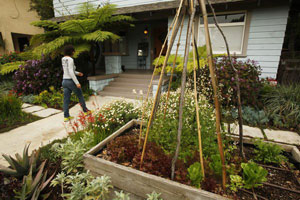
 I have 4 tips to make your kitchen greener, and you'll be happy to know they all respect the other green category – money.
I have 4 tips to make your kitchen greener, and you'll be happy to know they all respect the other green category – money.
1) Eat greener. The lower you eat on the food chain, the better it is for the environment. It simply takes more land / energy / water to grow a pound of beef than it does to grow a pound of broccoli or eggplant.
2) Recycle those table scraps, so you can turn them into compost. Get a small container with a lid, maybe even an old diaper pail, and keep all that old plant matter left over from preparing and eating a meal. No animal products. Just veggie scraps. Phase two happens out in the yard when you turn the table scraps into plant food by making compost.
3) Use non-toxic cleaning products. Your food sat on that counter, for God's sake. AND, vinegar and water and baking soda are much cheaper than the harsh chemical alternatives.
4) Avoid single use plastic whenever possible. Store your leftovers in re-useable containers that last for many years and save some dough. Plastic bags cost a lot over time.

 After spending years in the political closet (one of the dangers of a politically mixed marriage) I have emerged with a flourish, and a job as Press Person for a Michigan candidate for the United States House of Representatives. I have been working for Bob Alexander, a Democrat running in Michigan’s 8th Congressional District, against Mike Rogers, a four-term Republican incumbent. Bob is the kind of Democrat my parents are – a Joan Baez, “if you want peace, work for justice” kind of guy who spent years circulating petitions and working crowds “cold” to promote the value of a living wage for working people, and eventually persuaded the Michigan legislature to raise the minimum wage by 29 percent. He was not holding office at the time, mind you; it was just the right thing to do.
After spending years in the political closet (one of the dangers of a politically mixed marriage) I have emerged with a flourish, and a job as Press Person for a Michigan candidate for the United States House of Representatives. I have been working for Bob Alexander, a Democrat running in Michigan’s 8th Congressional District, against Mike Rogers, a four-term Republican incumbent. Bob is the kind of Democrat my parents are – a Joan Baez, “if you want peace, work for justice” kind of guy who spent years circulating petitions and working crowds “cold” to promote the value of a living wage for working people, and eventually persuaded the Michigan legislature to raise the minimum wage by 29 percent. He was not holding office at the time, mind you; it was just the right thing to do. The future of our food system is at a critical juncture, says Arty Mangan, Food and Farming Program Director for Bioneers. “The industrial agriculture industry says that they want to feed the world, but at what cost?”
The future of our food system is at a critical juncture, says Arty Mangan, Food and Farming Program Director for Bioneers. “The industrial agriculture industry says that they want to feed the world, but at what cost?”
 Cooking and eating more sustainably doesn't require that you rethink your entire life. Here are some simple things you can do to get started.
Cooking and eating more sustainably doesn't require that you rethink your entire life. Here are some simple things you can do to get started.